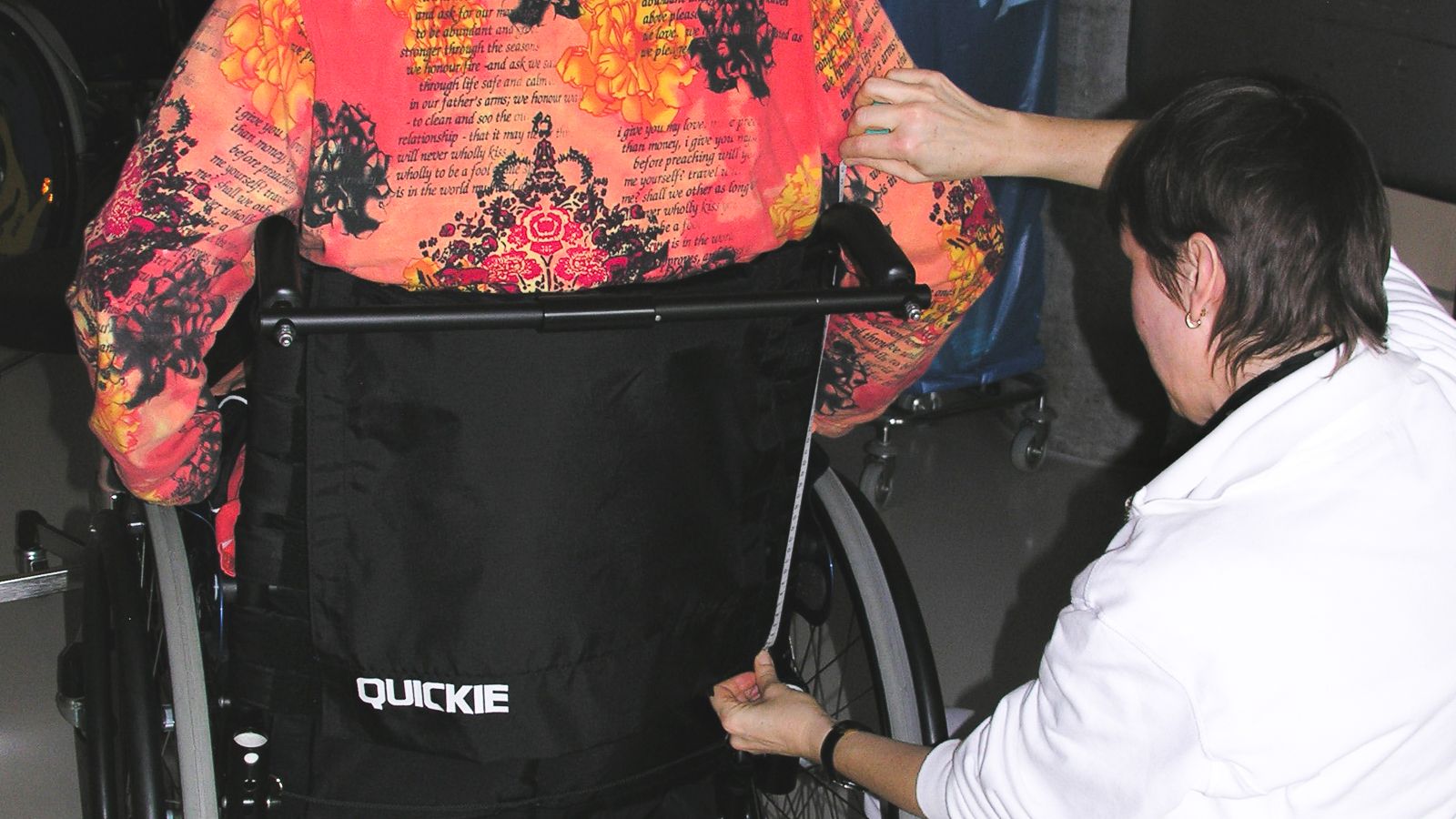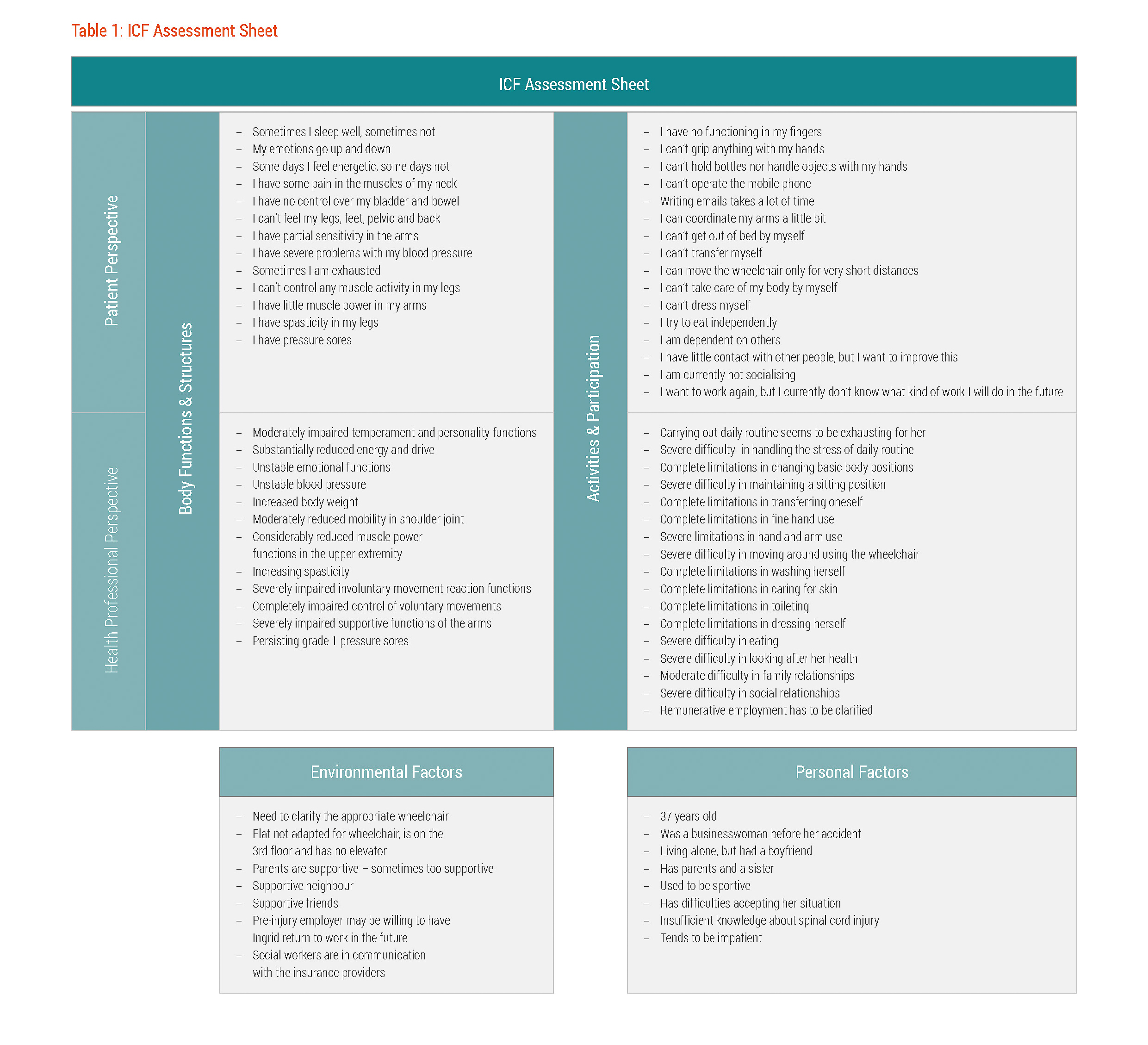Assessment

Ingrid's rehabilitation team utilised the framework of the International Classification of Functioning, Disability and Health (ICF)20 to document the results of the first assessment of Ingrid's functioning using the ICF Assessment Sheet. The ICF Assessment Sheet is an overview of the assessment results according to the ICF components of body functions and structures, activities and participation, and environmental and personal factors, and includes both the health professional and patient perspectives. Ingrid's perspective was reflected by relevant statements she made during the assessment phase of the Rehab-Cycle®.

Table 1: ICF Assessment Sheet
As before the start of the Rehab-Cycle® Ingrid experienced impaired bladder and bowel functions, blood pressure instability, increasing spasticity, decreased involuntary movement reaction functions, reduced muscle power in her upper extremities, even in the areas above the level of her injury, and decreased mobility in both shoulder joints. Furthermore, a physical examination revealed persisting pressure sores.
""Ingrid's mood swings and energy level problems were major issues that needed to be addressed during rehabilitation.""
During the comprehensive assessment, Ingrid's emotional functioning was explored. Emotional functioning, a category within the ICF component of body functions, played an important role in Ingrid’s overall functioning and psychosocial well-being. Ingrid indicated that her emotions swung from “highs to lows” on a daily basis; she felt that her neck pain contributed to her mood swings. Furthermore, her energy level fluctuated from day to day, often having low energy. The rehabilitation team quickly recognised that Ingrid's mood swings and energy level problems were major issues that needed to be addressed during rehabilitation.
Regarding activities and participation, Ingrid’s limitations in fine hand use, hand and arm use, difficulties in transferring, dressing, and other self-care activities left Ingrid feeling extremely dependent and constrained. Further exacerbating these feelings, her wheelchair mobility was limited to only short distances. The rehabilitation team also observed that Ingrid’s difficulties in changing body positions and maintaining a sitting position contributed to her mobility limitations.
""...she was not interested in making friends with others in the rehabilitation centre.""
With regard to her participation in social life, Ingrid indicated that she had limited contact with others. Nevertheless, she was not interested in making friends with others in the rehabilitation centre.
Ingrid also expressed concerns regarding her vocational future. Despite her worries, her pre-injury employer showed an interest in having Ingrid return to her position at some undefined date in the future.
Ingrid's functioning status was greatly influenced by environmental and personal factors. For example, although she received a lot of support from her family and friends, Ingrid felt that her family's support was sometimes “too much”, overwhelming her with their attention. Another major concern was the lack of wheelchair accessibility in her flat. This left open questions about where she would be able to live upon discharge from the rehabilitation centre. Uncertainty about finding a new place of residence contributed to Ingrid's difficulties in coping with her new life situation.
""At the time of the assessment, Ingrid was unable to cope with nor accept her health problems and new life situation.""
Inadequate coping was one of several personal factors that significantly impacted Ingrid's emotional state, and ultimately her functioning. At the time of the assessment, Ingrid was unable to cope with nor accept her health problems and new life situation. Particularly difficult for her was being totally dependent on others. Ingrid's lack of knowledge about spinal cord injury (SCI) and its implications for her life may have contributed to her coping and emotional problems.
The results of the comprehensive assessment were taken into account in creating a profile of Ingrid's functioning, as well as for goal-setting and determining the targets Ingrid and her rehabilitation team intended to address with interventions.